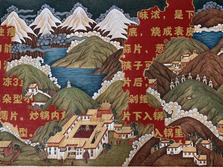
Tashi was born in 1979 in Shigatse, Tibet Autonomous Region (TAR), China. Now he lives and works in Lhasa. Right after graduating from the Academy of Arts, Minzu University of China in 2003, Tashi and the other artists established Bocun Art Space. Since 2010, he has been working as a teacher at Lhasa Middle School. His works were showed in different art institutions and galleries such as Coral & Feather Gallery (Beijing), Songzhuang Art Center (Beijing), Bocun Art Space (Tibet) and more. Currently, he participated in The 9th China International Youth Art Festival (Beijing) and The 13th Asian Contemporary Art Show (Hong Kong).
扎西1979年出生于中国日喀则,现工作居住于中国西藏拉萨。2003年从中央民族大学美术学院毕业后,于同年与其他艺术家成立了西藏博存艺术空间。从2010年开始在拉萨中学当教师。他的作品在不同艺术机构展出,如:珊和⽻羽画廊(北京)、宋庄美术馆(北京)、博存艺术空间(西藏)等。目前,参加过第九届国际青年艺术展以及十三届香港亚洲当代艺术展。
Artistic Statement
Art to me is a universal language. Although people have different skin colors and different native languages from different countries, art is always interlinked. Art means to experience life, enjoy life, record life and improve aesthetic taste. Emotion is a highly essential part of my life. It can not only enrich and influence life, but also reflects the value of objective things. The relationship between art and religion reflected in my works came from life, but it was not all a direct reaction of real life. Instead, it was expressed by imagination and exaggeration
In my opinion, there is no distinction between contemporary Tibetan art and Chinese or world contemporary art, but artists just use different ways to express. As Fei Xiaotong said, “when we appreciate the culture values of others as our own, the world will become a harmonious whole. Everybody cherishes his or her own culture/values, and if we respect and treasure other's culture values, the world will be a harmonious one.”
艺术家理念
艺术于我而言是一种全世界通用的语言。尽管人有各种肤色,来自不同的国家有不同的母语,但艺术始终是相通的。艺术也意味着体验生活,享受生活,记录生活,提高审美情趣。情感是我生命中很重要的一部分,它不仅可以丰富生活,影响生命,也能体现客观事物的价值。我的作品里所反映出的艺术与宗教的关系皆来源于生活,但也不全是现实生活的直接反应,而是以想象和夸张的方式来表现。
我认为是西藏当代艺术和中国或者世界当代艺术都没有高下之分,只是表达的方式不同,就像费孝通先生说的:各美其美,人美之美,美美与共,天下大同。

